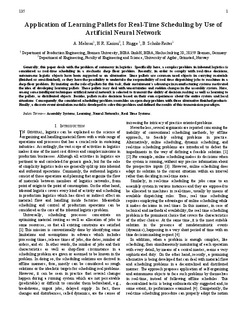Application of learning pallets for real-time scheduling by use of artificial neural network
Chapter, Peer reviewed
Permanent lenke
http://hdl.handle.net/11250/136823Utgivelsesdato
2011Metadata
Vis full innførselSamlinger
Originalversjon
Mehrsai, A., Karimi, H. R., Rügge, I., & Scholz-Reiter, B. (2011). Application of learning pallets for real-time scheduling by use of artificial neural network 5th International Conference on Software, Knowledge Information, Industrial Management and Applications (SKIMA) (pp. 60-67): IEEE.Sammendrag
Generally, this paper deals with the problem of autonomy in logistics. Specifically here, a complex problem in inbound logistics is considered as real-time scheduling in a stochastic shop floor problem. Recently, in order to comply with real-time decisions, autonomous logistic objects have been suggested as an alternative. Since pallets are common used objects in carrying materials (finished or semi-finished), so they have the possibility to undertake the responsibility of real time dispatching jobs to machines in a shop-floor problem. By insisting on the role of pallets for this task, their sustainment's advantage in manufacturing systems motivated the idea of developing learning pallets. These pallets may deal with uncertainties and sudden changes in the assembly system. Here, among some intelligent techniques artificial neural network is selected to transmit the ability of decision making as well as learning to the pallets, as distributed objects. Besides, pallets make decisions based on their own experiences about the entire system and local situations. Consequently, the considered scheduling problem resembles an open shop problem with three alternative finished products. Finally, a discrete event simulation model is developed to solve this problem and defined the results of this transmission paradigm.
Beskrivelse
Author's version of a chapter in the book: 5th International Conference on Software, Knowledge Information, Industrial Management and Applications (SKIMA). Also available from the publisher at: http://dx.doi.org/10.1109/SKIMA.2011.6089986
